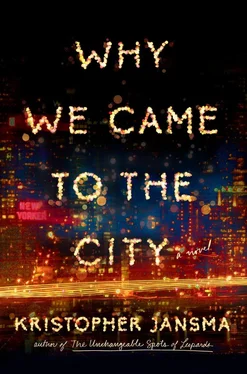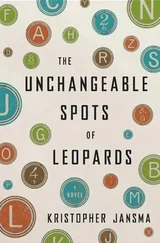Sara shot him a deadly look. “If we’d waited, you’d have come up with some excuse not to do it! I can’t wake up one more time to find you drunk on the couch hugging her ashes.”
“Well, excuse me if I’d rather go to bed with something that isn’t running to the gym every time I turn around. You’re always anywhere but next to me!”
He gave the compass another heavy whack, but the needle continued to declare they were heading north, when all logic and physics would dictate that they were heading east , away from the setting sun.
“My skin is peeling off,” Sara sobbed. “I’m starving. And we’re going to die out here.”
“We’re not going to die,” he insisted, though he was beginning to fear the same.
“Forget where the sun is, and think about what we do when it goes down ,” she shouted. “We’ll be out in the middle of the woods, with no lights, and no food—”
He smacked the compass again even harder, but it didn’t budge.
“Would you cut that out?” she screeched, angrily clawing at his arm. “You’re going to break the damn thing, and then what?”
“It’s already broken!” he shouted. “That’s not south!”
“Who gives a shit?” she shouted back at him. They hadn’t fought like this in — ever. Normally they fought about reasonable things, like what movie to see or whether to have Christmas with his family or hers. One of them would inevitably give in (usually George), and they’d move on without animus. He didn’t know how to hold a grudge, and if she did, well, she didn’t when it came to him. But here there was no giving in, no moving on. They couldn’t escape this.
It seemed to her that as furious as she was with him now, it was, in a sense, nothing new. She’d felt this way for a long time now, since he’d stopped being the George she’d always known. She wondered if he knew how much he’d changed, and if he thought she was different now. They’d been together such a long time, and partly they had managed it because they had never demanded very much of each other. Love, faithfulness, kindness: these had all come easily. It had never been very hard to make things easy for each other. But these past few years they had begun to lean harder. When Irene got sick, they had begun needing more from each other. They’d both changed, little by little, and she hadn’t minded it because she’d assumed that when it was all over, they’d return to the way they’d been before.
But what if there was no way back to before? Now it was as if he couldn’t stand unless she were propping him up. Drinking, moping, miserable. And without him, what would become of her? Would she keep running and subtracting from herself and trying to beat her life into lists of manageable tasks? And the worst thing — what she was sickest of — wasn’t George or herself at all, but the vast expanse of years ahead of them. Time upon time during which they would surely go on changing and needing each other and being disappointed and losing things they loved and having no control, and she was terrified of it, absolutely terrified, so much that it made her want to throw up.
“Who cares?” she screamed. “Who cares?”
Then George shrieked and howled like a crazy person. He set his pack down on the ground and fumbled madly with the urn.
“Don’t! What are you doing?” she yelled.
Her words bounced off the trees and vanished into the deep crimson sunset. Orange light cascaded off the clouds, which for a moment looked like great plateaus above them. When she was a girl, she’d believed that was where dead people went, fluttering around on little wings with their harps and white robes.
George looked triumphant as he heaved the great iron urn up above his head — and nearly toppled under its weight.
“What are you doing ? Put that back! ” she screeched.
“Irene! Irene!” he was shouting. Streaks of tears dripped from his pinched eyes. The compass. “She’s a magnet!”
He was ready to fling the urn at the nearest tree. He hated it with all his might. He wanted to see it crack in half, to watch a gray cloud of soot and sediment mushroom out and disappear onto the forest floor and be gone forever. Lost. Perdu. But even as he stood poised at last to be rid of Irene — who had sent them on this insane journey, who had nearly gotten them killed, who he saw now had ruined the past three years of their lives — George couldn’t let go.
“Stop,” Sara said softly. She eased the urn away from him and set it on the ground and held her husband closely. He breathed in and then sobbed.
They sat silently and watched quietly as the sun went down and darkness fell. They felt the forest come alive around them. They each felt the other in their arms. They wished Irene were really there. They wanted to close their eyes and sleep and not worry about waking up in the morning. They watched as one by one, tiny pinpoints of stars emerged above them — some brilliant and some barely glowing — but in the darkness there were millions and millions.
George looked down at his pale, weak, pained body. Sixty percent of it was indistinguishable from the little drips of water that clung to the sides of the empty canteen. Mostly, he was just a mixture of oxygen and hydrogen. Eighteen percent carbon. Three percent nitrogen. Some calcium and potassium and other salts. All down the line, these were the same elements that he measured every day in the stars of the Ring Nebulae, the same as in the sun, as in all the stars in the universe. On an atomic level, he was constructed from fused leftovers, expelled into the void when these stars inevitably collapsed. In a way it comforted him that he was elementally connected to everyone and everything — even if, as he lay in the dirt, he felt sure there was also something to him beyond atoms. He’d seen something leave Irene, in those final seconds, and it wasn’t energy or matter.
Back in high school physics he’d learned the cycle of decay and renewal over the course of millennia, and what a small footnote mankind was, when you looked at the entirety. But what he hadn’t learned until much later was that for millennia, these stars, perceived by the naked eye, were thought to be, well, what they appeared to be: lonely, single points of light, isolated by billions of miles. But with better telescopes, astronomers in the seventeenth century had first noticed that some of these single dots were really two stars orbiting each other, or some common point, but in any case swirling close together. And now scientists had discovered that the vast majority, over 80 percent, of stars in the universe were these binary systems. Some were even multiple systems, three or more stars bound up in the same complex gravity.
He could hear Sara breathing beside him, and he reached over to take her hand. It was surprisingly warm. But he knew he shouldn’t be so surprised. She — this woman he loved — was a great inferno of carbon and nitrogen and water, orbiting his own glowing, celestial body as it, in turn, circled hers.
“I don’t think I’ve ever seen this many stars,” she said, as awed as he was by the wide, bright swath of the Milky Way, stretching above them from one end of the valley to the other. Silently they stood up and, eyes fixed on the heavens, lofted Irene’s urn from the damp earth. He held the base while Sara unscrewed the lid. Together they tipped it into the soft wind that remained of the earlier storm. In the dark they could barely see each other or the ashes as they swirled away, but they felt the urn getting lighter as they emptied it. George believed that on some microscopic level the last elemental traces of Irene would change this spot and, even if imperceptibly, affect all that would someday grow from it, just as surely as she had forever changed his life and all their lives.
Читать дальше












